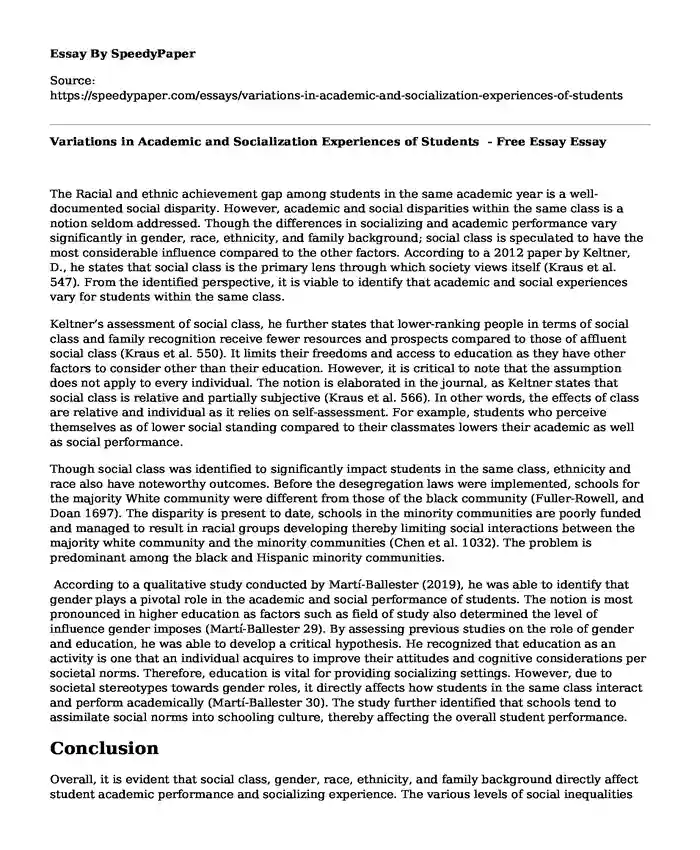The Racial and ethnic achievement gap among students in the same academic year is a well-documented social disparity. However, academic and social disparities within the same class is a notion seldom addressed. Though the differences in socializing and academic performance vary significantly in gender, race, ethnicity, and family background; social class is speculated to have the most considerable influence compared to the other factors. According to a 2012 paper by Keltner, D., he states that social class is the primary lens through which society views itself (Kraus et al. 547). From the identified perspective, it is viable to identify that academic and social experiences vary for students within the same class.
Keltner’s assessment of social class, he further states that lower-ranking people in terms of social class and family recognition receive fewer resources and prospects compared to those of affluent social class (Kraus et al. 550). It limits their freedoms and access to education as they have other factors to consider other than their education. However, it is critical to note that the assumption does not apply to every individual. The notion is elaborated in the journal, as Keltner states that social class is relative and partially subjective (Kraus et al. 566). In other words, the effects of class are relative and individual as it relies on self-assessment. For example, students who perceive themselves as of lower social standing compared to their classmates lowers their academic as well as social performance.
Though social class was identified to significantly impact students in the same class, ethnicity and race also have noteworthy outcomes. Before the desegregation laws were implemented, schools for the majority White community were different from those of the black community (Fuller-Rowell, and Doan 1697). The disparity is present to date, schools in the minority communities are poorly funded and managed to result in racial groups developing thereby limiting social interactions between the majority white community and the minority communities (Chen et al. 1032). The problem is predominant among the black and Hispanic minority communities.
According to a qualitative study conducted by Martí-Ballester (2019), he was able to identify that gender plays a pivotal role in the academic and social performance of students. The notion is most pronounced in higher education as factors such as field of study also determined the level of influence gender imposes (Martí-Ballester 29). By assessing previous studies on the role of gender and education, he was able to develop a critical hypothesis. He recognized that education as an activity is one that an individual acquires to improve their attitudes and cognitive considerations per societal norms. Therefore, education is vital for providing socializing settings. However, due to societal stereotypes towards gender roles, it directly affects how students in the same class interact and perform academically (Martí-Ballester 30). The study further identified that schools tend to assimilate social norms into schooling culture, thereby affecting the overall student performance.
Conclusion
Overall, it is evident that social class, gender, race, ethnicity, and family background directly affect student academic performance and socializing experience. The various levels of social inequalities based on gender, race, ethnicity or socioeconomic class are present in the education system. However, it was also identified that they are subjective and relative factors. In other words, they are individualized factors which do not have the same effect on every student.
Works Cited
Chen, Xiaochen et al. "Ethnicity, Peers, And Academic Achievement: Who Wants To Be Friends With The Smart Kids?". Journal Of Youth And Adolescence, vol 49, no. 5, 2020, pp. 1030-1042. Springer Science And Business Media LLC, doi:10.1007/s10964-019-01189-7. Accessed 11 July 2020.
Fuller-Rowell, Thomas E., and Stacey N. Doan. "The Social Costs Of Academic Success Across Ethnic Groups". Child Development, vol 81, no. 6, 2010, pp. 1696-1713. Wiley, doi:10.1111/j.1467-8624.2010.01504.x. Accessed 11 July 2020.
Kraus, Michael W. et al. "Social Class, Solipsism, And Contextualism: How The Rich Are Different From The Poor.". Psychological Review, vol 119, no. 3, 2012, pp. 546-572. American Psychological Association (APA), doi:10.1037/a0028756. Accessed 11 July 2020.
Martí-Ballester, Carmen Pilar. "Factors That Influence Academic Performance: Analyzing Gender Differences In Accounting Students". Revista Educación, vol 43, no. 2, 2019, p. 29. Universidad De Costa Rica, doi:10.15517/revedu.v43i2.28916. Accessed 11 July 2020.
Cite this page
Variations in Academic and Socialization Experiences of Students - Free Essay. (2023, Oct 03). Retrieved from https://speedypaper.net/essays/variations-in-academic-and-socialization-experiences-of-students
Request Removal
If you are the original author of this essay and no longer wish to have it published on the SpeedyPaper website, please click below to request its removal:
- Digital Citizenship Essay Sample
- Essay Example Comprising an Analysis of Doll's House Play
- Essay Sample on the Immigration in the United States of America Today
- Education Essay Example: Urban Design and City Planning MSc
- How English Can Influence a Student's Future Career - Essay Sample
- Free Essay. Education Through Structural Functionalism, Symbolic Interactionism, And Conflict Theory
- Free Paper Sample on Undocumented Immigration
Popular categories





